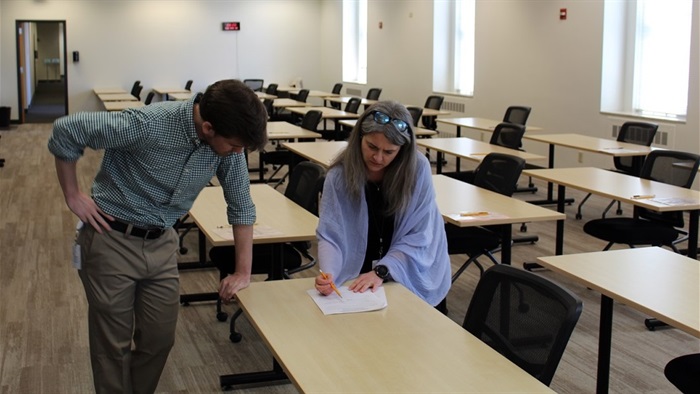
The Police Officer test consists of two phases.
Phase One: Multiple Choice
 The multiple-choice exam assesses knowledge needed to be a successful in the Police Training Academy. This tests your ability to spell and properly use common words used in the English language, your ability to comprehend written text, and your ability to understand cardinal (north, south, east, and west) directions and read maps.
The multiple-choice exam assesses knowledge needed to be a successful in the Police Training Academy. This tests your ability to spell and properly use common words used in the English language, your ability to comprehend written text, and your ability to understand cardinal (north, south, east, and west) directions and read maps.
The multiple-choice exam consists of up to 100 test questions in four main sections.
1. Spelling: The first type of question in this section asks you to identify the word that is spelled correctly. The second type asks you to identify the word that is spelled incorrectly.
2. Vocabulary: The first type of question in this section asks you to identify the word that is most similar in meaning to a given word. The second type asks you to identify the word that is most opposite in meaning to a given word.
3. Reading Comprehension: This section has written passages followed by questions about each passage.
4. Map Reading: This section has several maps followed by questions about each map.
Download the Police Officer MC Prep Guide (PDF)(PDF, 772KB) or have one mailed to you by emailing our offices at policefiretesting@columbus.gov.
Phase Two: Situational Response Assessment
The Situational Response Assessment (SRA) is designed to assess your ability to handle situations that require interacting with other people such as citizens, supervisors, subordinates, co-workers, etc.
The SRA is a video-based exam consisting of six test scenarios. Each scenario features a situation commonly encountered by police officers.
Watch this video to see a practice scenario.
Your video-recorded responses will be evaluated on your situational awareness, social intelligence and problem resolution skills demonstrated in your responses to each situation.
Download the Police Officer SRA Prep Booklet (PDF)(PDF, 507KB) or have one mailed to you by emailing our offices at policefiretesting@columbus.gov.
Earned Preference Points
Secondary Language Fluency Earned Points
Additional credit on the SRA may be available for proficiency in one or more pre-designated languages.
Learn More (PDF)(PDF, 205KB)
Certified / Lateral Applicants
Submit your law enforcement certification that is equivalent to the Ohio Peace Officer Basic Training Certificate to bypass taking both phases of the Police Officer Exam.
Veterans' Preference
If you served in the United States Military and can provide acceptable documentation of your service, you may be eligible for the addition of extra points to your passing exam score.
Learn More (PDF)(PDF, 734KB)
Accommodations
To request a testing accommodation, please find the appropriate form in our "Public Forms" section. Accommodations are given on a case-by-case basis determined by staff's ability to accommodate while maintaining test integrity.
Accommodation requests should be completed immediately after you file your application or as soon as you know an accommodation is needed.
Examples of accommodations:
- Military Accommodation: You are on a military assignment that does not allow you to test on the assigned test date. Complete the non-ADA accommodation form. Include your orders to serve in the military that cover the test dates. Depending on the circumstances, the result could be taking the exam on another day or taking the exam remotely with the assistance of a military test proctor.
- Disability Accommodation: You have a disability that impacts your ability to test. Complete the ADA Part 1 and Part 2 forms. Part 1 documents your qualifying disability and once approved by the City, does not need completed again. Part 2 is your requested accommodation and needs to be completed for each exam. Depending on the circumstances, the result could be an alternate test date in a smaller room, extended time, a reader (not available for exams where reading comprehension is assessed), or verbal instructions provided in writing (not available for exams where listening skill is assessed).
- English is a Second Language Accommodation: English is not your first language and you need more time to review written test information expressed in English. Complete the non-ADA accommodation form. The result could be more allowable response time for exam sections that are not response-time sensitive.
Personal History Statement
After you pass the first phase of the exam, you will be contacted via email about completing a Personal History Statement (PHS). Instructions regarding the PHS will be provided with the email.
The PHS is a vital piece of your background investigation. The PHS asks for your current and previous addresses and telephone numbers for you and your family members. The PHS asks for employment, military and any criminal history. Include complete names, addresses and dates. The completeness and accuracy of the information you provide will be verified by means of a polygraph examination.
The documents listed below must be brought when you meet your investigator
- driver's license, birth certificate, marriage license, divorce decrees or annulment decree, etc.
- high school diploma and transcript of grades, G.E.D. certificate and college diploma and transcripts, copies of state of Ohio certifications
- military documents, DD-214, discharge certificate, copies of awards, etc.
- proof of automobile insurance
Retest Policy
You can test up to two times in a calendar year.
Learn More (PDF)(PDF, 125KB)